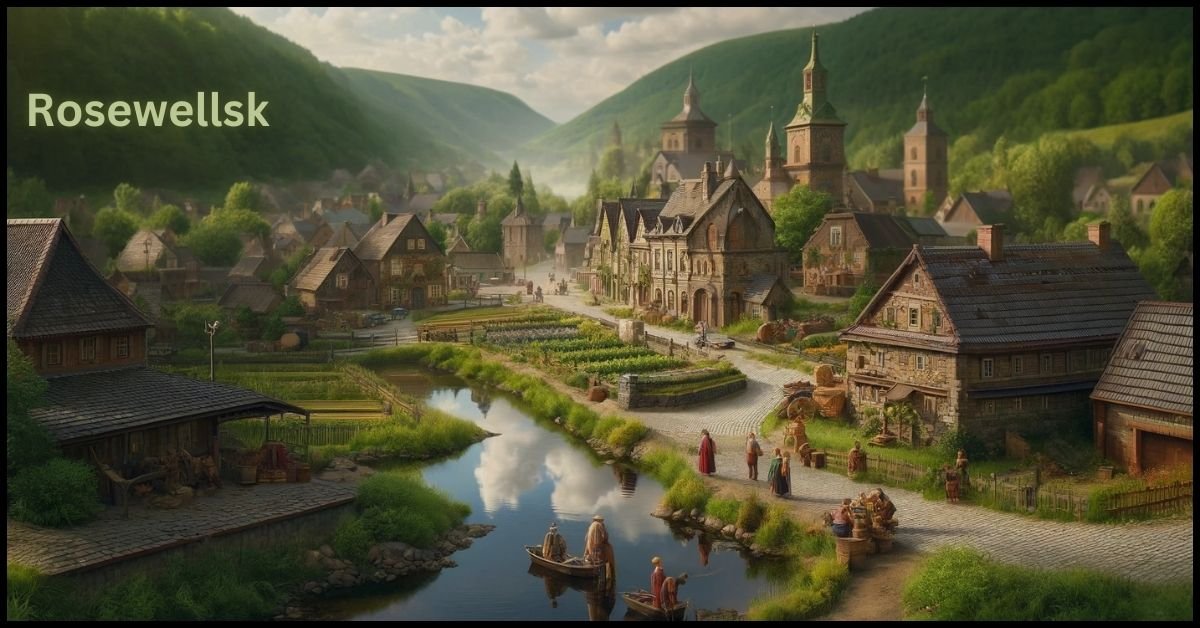The Rich History and Culture of Rosewellsk: A Comprehensive Guide

Introduction:
Nestled amidst picturesque landscapes, Rosewellsk is a town that boasts a deep, rich history and a thriving culture. Its origins trace back centuries, and the unique blend of traditions, customs, and historical events make it a captivating place for history enthusiasts, cultural explorers, and curious travellers alike. Although not widely known outside its borders, Rosewellsk holds a treasure trove of stories, monuments, and practices that reflect its diverse cultural heritage.
In this comprehensive guide, we will take you on a journey through the storied past of Rosewellsk, from its early foundations to its role in modern times. We will explore the local culture that has evolved over generations, the historical events that shaped the town, and the traditions that continue to define its identity today. Whether you’re planning a visit or simply eager to learn more, this article will serve as your complete introduction to the rich history and vibrant culture of Rosewellsk.
The Origins of Rose wellsk: Tracing Its Beginnings
The history of Rosewellsk dates back over a thousand years, with the earliest records pointing to its establishment as a small settlement by early Slavic tribes. Rose wellsk became an essential hub for commerce and cultural exchange at the crossroads of major trade routes. Its strategic location allowed it to benefit from both Eastern and Western influences, leading to a diverse population that contributed to developing its unique identity.
In its early days, Rose wellsk was primarily a village known for its agricultural activities. However, its proximity to larger cities and trade routes meant it was often involved in broader political and economic events. Over time, the settlement grew, evolving from a simple agricultural community into a bustling town that attracted merchants, artisans, and intellectuals. By the Middle Ages, Rose wellsk had become a key player in regional trade, and its people developed a reputation for their craftsmanship and artistry.
During the era of the great empires, Rose wellsk found itself under the influence of several powerful states. The town was part of various monarchies, and its role in these larger political structures further shaped its development. Despite the external pressures and invasions that occasionally disrupted life, Rosewellsk retained its cultural identity, adapting and blending the traditions of its conquerors with its own.
The Rise of Rosewellsk: Flourishing During the Renaissance
The Renaissance period was a time of significant cultural and intellectual growth for Rosewellsk. Like many European towns, Rose wellsk experienced a flourishing of the arts, science, and philosophy during this era. The city became a beacon of enlightenment, with local scholars and artists significantly contributing to literature, music, and visual arts.
One of the most notable figures from this period was the philosopher and poet Andrei Ivanovich, whose writings on morality and society profoundly impacted the intellectual climate of Rosewellsk. Ivanovich’s works were widely read, and his ideas on governance, ethics, and the role of the individual in society influenced generations of thinkers in the region. In addition to intellectual pursuits, Rose wellsk’s artisans produced exquisite pieces ranging from intricately crafted jewellery to stunning tapestries still preserved in museums today.
As the Renaissance advanced, the town became increasingly connected to the broader cultural movements of the time. Rose wellsk began to attract international attention for its vibrant artistic community, with scholars, artists, and musicians visiting from across the continent. This period laid the foundation for the town’s lasting reputation as a centre of culture and innovation.
The Culture of Rosewellsk: Traditions That Endure
Today, Rosewellsk is known for its strong cultural traditions that have been passed down through generations. These customs reflect the town’s rich history and the diverse influences that have shaped it over the centuries. From festivals to culinary delights, Rosewellsk offers a window into a way of life that has remained resilient in the face of change.
One of the town’s most beloved traditions is its annual Rose wellsk Festival, a celebration of music, dance, and art that brings together locals and visitors. The festival, which dates back to the early 19th century, showcases the town’s cultural heritage, featuring performances by local musicians, theatrical productions, and exhibitions of Rosewellsk’s traditional crafts. The festival serves not only as a reminder of the town’s artistic legacy but also as a means of fostering community spirit and pride.
Another central aspect of Rosewellsk’s culture is its cuisine. Local dishes are deeply rooted in the town’s agricultural history, emphasizing seasonal ingredients and traditional cooking methods. Rose wellsk’s signature dish, Roskovsky Stew, is a hearty meal made with locally sourced meats and vegetables, and it has become a symbol of the town’s culinary tradition. Visitors to Rose wellsk often enjoy dining in the town’s historic restaurants, where the atmosphere is as rich as the food.
Craftsmanship also plays a significant role in Rosewellsk’s cultural identity. The town is known for its fine pottery, handwoven textiles, and intricate woodwork, all of which reflect the skills of its artisans. Many of these crafts have been passed down through generations, with families running workshops that continue to produce goods using traditional techniques. These artisanal products are highly sought after by collectors and tourists, further cementing Rose wellsk’s reputation as a hub of creativity and craftsmanship.
The Role of Rosewellsk in Modern History
The 20th century brought both challenges and opportunities to Rose wellsk. Like much of the world, the town was caught in the tumultuous events of World War I and World War II. During these periods, Rosewellsk’s residents faced hardships as the city became a site of military occupation and political unrest. However, Rose wellsk’s spirit remained unbroken, and the community showed remarkable resilience in adversity.
In the post-war years, Rosewellsk experienced significant changes as it modernized and industrialized. New technologies and industries were introduced, and the town’s economy diversified. Despite these changes, Rosewellsk always retained its cultural roots. The city continued to value education, the arts, and maintaining its cultural heritage. Local institutions, including museums and libraries, worked tirelessly to preserve the history and traditions of Rose wellsk, ensuring that future generations would deeply understand their past.
Today, Rosewellsk stands as a testament to the endurance of tradition in the modern world. It is a place where the old and the new coexist harmoniously, with the town embracing progress while remaining rooted in its cultural history. Rose wellsk continues attracting visitors drawn to its unique blend of historical significance and contemporary vibrancy.
READ MORE: Viktoriia from Braless Forever: Embracing Freedom and Confidence
FAQs about the History and Culture of Rosewellsk
What is the historical significance of Rosewellsk?
Rosewellsk has a rich history that spans over a thousand years. It began as a small settlement and became a cultural and intellectual hub during the Renaissance. Throughout history, the town has been influenced by various empires and cultures, contributing to its diverse identity.
How did Rosewellsk’s culture develop over time?
Rosewellsk’s culture evolved through local traditions, foreign influences, and artistic movements. The Renaissance period played a significant role in shaping the town’s intellectual and creative culture, while the town’s cuisine, music, and crafts have been handed down through generations.
What are some traditional customs in Rosewellsk?
Rosewellsk is known for its annual Rose wellsk Festival, which celebrates the town’s artistic heritage. Additionally, local cuisine, such as Roskovsky Stew and handmade crafts like pottery and textiles, are critical elements of Rosewellsk’s cultural identity.
How did World War II impact Rosewellsk?
Like many European towns, Rose wellsk was affected by World War II. The city experienced military occupation and political unrest, but its residents showed resilience, maintaining their cultural traditions and rebuilding the community in the post-war years.
What is Rosewellsk’s most famous dish?
The signature dish of Rosewellsk is Roskovsky Stew, a hearty meal made with locally sourced meats and vegetables. It reflects the town’s agricultural history and is a staple of the local cuisine.
How can I experience the culture of Rosewellsk today?
Visitors to Rosewellsk can experience its rich culture by attending the Rose wellsk Festival, exploring local restaurants that serve traditional dishes, and visiting the town’s artisan workshops that showcase pottery, textiles, and other handcrafted goods.
Conclusion
Rosewellsk is a town where history and culture are intricately woven together, creating a unique tapestry that continues to captivate both locals and visitors. From its early days as a small settlement to its role as a cultural beacon during the Renaissance, Rose wellsk’s legacy is one of resilience, creativity, and tradition. Its ongoing commitment to preserving its heritage while embracing modern advancements ensures that this fascinating town will continue to thrive for generations. Whether you are drawn to its historical landmarks, vibrant festivals, or culinary delights, Rose wellsk offers a truly unforgettable experience.

Aria Skye is a creative writer at TechWriks.com, specializing in exploring topics across technology, business, and lifestyle. With a flair for storytelling and a passion for uncovering the latest trends, Aria delivers engaging and informative content that resonates with readers.